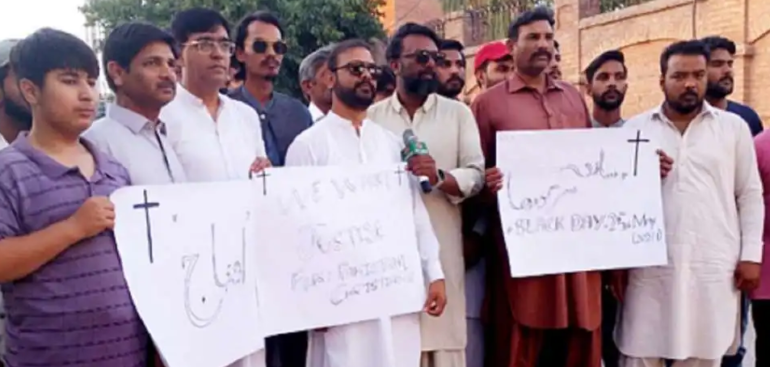Christians in Pakistan have organized nationwide protests in response to another mob attack over blasphemy that occurred in central Punjab province on May 25.
“We demand justice for the Christian community. These tragedies are recurring,” stated Nosherwan Iqbal, Chairman of the Peace Committee in the Hazara division of northwestern Khyber Pakhtunkhwa province.
From Peshawar in Khyber Pakhtunkhwa to Karachi in Sindh, large gatherings of Christians protested the attack on two houses and a shoe factory in the Sargodha district of Punjab.
Nazir Masih, a Christian factory owner, is accused of burning pages of the Quran in the Mujahid Colony residential area and was subsequently attacked by a mob of over 400 individuals armed with batons, bricks, and stones.
“Our brother, a businessman, was victimized. We are peaceful people being pushed to their limits,” Iqbal said.
Over 200 Christian families from Sargodha, including approximately 100 Catholic families, have fled following this incident, marking another mob attack over blasphemy in Punjab province since the one in August last year.
Blasphemy is punishable by death in Pakistan, although the government has not executed anyone for this offense. However, mob lynchings are common in the South Asian nation of 241 million people, where Christians constitute less than 1.59 percent of the population.
The draconian blasphemy law in Pakistan is often misused to target Christian, Hindu, Sikh, and Ahmadi minority communities for personal vendettas. The Minorities Alliance Pakistan (MAP) has demanded punishment for the perpetrators of the violence in Sargodha.
Iqbal recalled the mob attack on churches and 80 houses in Jaranwala within the Faisalabad diocese last year, following allegations of Quran desecration by two local Christians.
A member of the Presbyterian Church who sustained serious injuries in Sargodha is currently receiving treatment in a hospital. His family members are being kept incommunicado after being rescued by security agencies.
Muhammad Jahangir, a counselor and property agent, alleged in his complaint to the police that Masih desecrated the Quran, thereby “spreading religious hatred, hurting the feelings of Muslims, and jeopardizing peace in the area.”
The police have registered cases against 450 unidentified individuals under an anti-terrorism law and have arrested 25 people in connection with the attack on Masih.
At one demonstration, Christians in Peshawar declared May 25 a “black day.” More than 500 protesters gathered at the Faisalabad District Council Chowk in central Punjab, blocking traffic for two hours. Additionally, 20 women burned their dupattas (headscarves) in protest, according to Akmal Bhatti, a Catholic political leader and head of the MAP.
“We feel our dignity is not safe. When our men are victimized under a sensitive religious law, women suffer, and daughters appear in courts,” said a woman coordinator of the MAP, who wished to remain anonymous.
“The violent incident in Sargodha has deeply affected our community and our children,” she added.
In Karachi, Christians held a protest at the Press Club, demanding the dismissal of senior police officials.
Video footage of the mob attack showed police inaction, a claim the police have denied.
The Sargodha district administration has banned rallies and imposed Section 144, a colonial-era law prohibiting public gatherings, effective until May 31. Additional police forces have been deployed to maintain law and order.
Father David John, parish priest of Divine Mercy Catholic Church in Mujahid Colony where the mob attack occurred, stated that the situation is now under control.
“Only a few families have returned, although the police have assured us of protection,” he added.
Fewer than 50 Catholics attended the Feast of the Blessed Trinity in Mujahid Colony on May 26, he noted.
“We are concerned about the repeated targeting,” said Father John, who now serves as a member of the peace committee established by the district administration.
